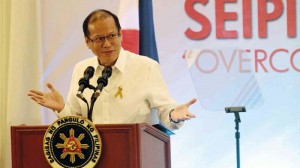MANILA, Philippines–It’s now up to President Aquino to sign the P2.606-trillion 2015 national budget.
Thirteen senators yesterday voted to approve the bicameral conference committee report on House Bill No. 4968, keeping the budget the President had proposed in the National Expenditures Program.
Aquino has until the end of the year to sign the measure into law.
The bicameral version included P72.5-billion last-minute realignments, which originally included the P53.9-billion planned government takeover-buyout of glitch-ridden Metro Rail Transit (MRT) 3.
Of the P53.9 billion, only P4.4 billion was retained. The balance was realigned to the Trade Remedies Fund (P4.384 billion); MRT taxes (P6.520 billion); Repair and Rehabilitation Fund (P20 billion); Incremental Revenue from Excise Tax for the Department of Health (P10.695 billion); Philippine Postal Corp. requirements (P.472 billion), and MRT Rehabilitation (P7.429 billion).
Free Wi-Fi in public
Also, some P1.070 billion of the P2.670-billion budget for Digitization Empowerment Program was realigned to fund the free Internet/Wi-Fi connection in public areas, and the P700 million for payment of the land on which the Philippine Children’s Medical Center (PCMC) sits was instead allotted to the construction of the PCMC building, among other realignments, Sen. Francis Escudero said on the Senate floor.
The bicameral version also introduced special provisions, including those requiring specifics of the farm to market roads in the Department of Agriculture budget; increasing the cash allowance for teachers from P1,300 to P1,500 per school year, and increasing the legal assistance fund of the Department of Foreign Affairs from P30 million to P100 million.
One key amendment was the inclusion of senior citizens, barangay (village) officials and workers in the coverage of the National Health Insurance Program.
Insurance policies
The measure also allows the departments of Education, Health, Public Works and Transportation to procure insurance policies for the repair, rehabilitation and reconstruction of structures damaged by calamities.
It also introduced a provision prohibiting the alteration, renovation or demolition of government buildings and open spaces deemed important cultural property, unless there is prior approval from the government and a consultation with stakeholders.
National heritage
It included some P100 million for the preservation of Gabaldon school buildings which are considered a part of the national heritage.
In view of the adverse Supreme Court ruling on the Disbursement Acceleration Program and Priority Development Assistance Fund, the bill also defined savings.
In the bill, savings refers to portion or balances of any released appropriations that have not been obligated arising from the discontinuance or noncommencement of a project, activity or program.
“Programmed appropriations, which had not been released or allotments not obligated due to the fault of the agency concerned, shall not be considered as savings,” it said.
The measure also required the Department of Budget and Management (DBM) to submit a post-2015 budget status report to Congress not later than 30 days after the third regular session opens, and a final report in March 2017.
Voice vote
The report should include the accomplishments, and projects, activities and programs funded with lump-sum appropriations and special purpose funds, it said.
The House of Representatives ratified the national budget and approved the P22.467-billion supplemental budget for this year two days before it adjourned for its annual Christmas break.
The 198 lawmakers present on the floor held a voice vote to approve the budget, which would allow the executive branch to comply with the Supreme Court decision declaring as unconstitutional parts of the DAP, supposedly an economic stimulus program using unused funds from slow-spending agencies.
Approved along with the P2.6-trillion budget was the P.7-billion worth projects submitted by the DBM in a 100-page errata after the original budget was approved by the House.
The House also voted 183 to 12 to approve the supplemental budget for 2014 which contained 10 projects that were supposed to be bankrolled by the DAP before it was outlawed in 2013.


